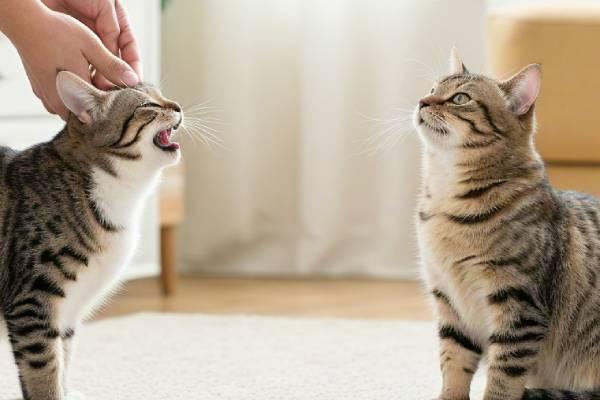Why Is My Cat Meowing Excessively and How to Stop It?
Excessive meowing in cats can signal anything from simple communication to underlying health or behavioral issues. Understanding the root cause is key to addressing it effectively. Below is a detailed guide to common reasons for excessive vocalization and actionable solutions.
Common Reasons for Excessive Meowing
1. Medical Issues
Pain or discomfort: Conditions like hyperthyroidism, kidney disease, dental pain, arthritis, or urinary tract infections (UTIs) can cause vocalization.
Cognitive decline: Older cats may meow excessively due to dementia or disorientation.
Deafness or vision loss: Sensory impairment can lead to confusion and louder meowing.
Hunger/thirst: Underlying issues like diabetes or thyroid problems may increase appetite or thirst.
What to do:
Visit a vet immediately to rule out medical causes. Bloodwork, urinalysis, or imaging may be needed.
2. Attention-Seeking Behavior
What to do:
Inconsistent feeding times or insufficient food may trigger persistent meowing.
Stick to a schedule: Feed at the same times daily.
Use automatic feeders: These dispense meals even when you’re not home.
Avoid overfeeding: Consult your vet to ensure portion sizes match your cat’s needs.
4. Mating Behavior
What to do:
Changes in routine, new pets, moving homes, or loud noises can trigger anxious meowing.
Create a safe space: Provide hiding spots (e.g., covered beds, cardboard boxes).
Use pheromone diffusers: Products like Feliway mimic calming cat pheromones.
Maintain routines: Consistency in feeding, play, and sleep schedules reduces stress.
6. Aging or Cognitive Dysfunction
What to do:
Some breeds (e.g., Siamese, Bengal, Oriental Shorthair) are naturally more vocal.
Accept natural behavior: Provide outlets for their energy (e.g., climbing towers, interactive toys).
How to Stop Excessive Meowing
Yell or punish: This increases stress and worsens vocalization.
Free-feed excessively: Overfeeding can lead to obesity, which creates new health problems.
Assume it’s "just being a cat": Sudden changes in vocalization often have a cause.
Why Do Cats Keep Meowing? Understanding the Causes and Solutions
Cats meow to communicate with humans, and while occasional vocalization is normal, persistent or excessive meowing often signals an underlying need or issue. Here’s a breakdown of common reasons cats meow and how to address them effectively.
1. Natural Communication
What to do:
Pain or Illness: Conditions like hyperthyroidism, arthritis, dental disease, UTIs, or gastrointestinal issues can cause discomfort.
Cognitive Decline: Older cats may yowl due to dementia or confusion.
Sensory Loss: Deaf or blind cats may meow loudly out of disorientation.
Visit a vet immediately if meowing is sudden, excessive, or paired with symptoms like lethargy, vomiting, or changes in appetite/litter habits.
3. Hunger or Thirst
What to do:
Cats learn that meowing earns rewards like play, treats, or lap time.
Ignore demand meowing: Only engage when your cat is quiet.
Schedule daily interactive play sessions (10–15 minutes) with wand toys or laser pointers.
Provide enrichment (e.g., cat trees, window perches) to reduce boredom.
5. Stress or Anxiety
What to do:
Create a safe space with hiding spots (e.g., covered beds, cardboard boxes).
Use pheromone diffusers (e.g., Feliway) to promote calmness.
Maintain a predictable routine for feeding and playtime.
Changes in routine, new pets, loud noises, or moving homes can trigger anxious meowing.
Separation anxiety may cause vocalization when left alone.
Stick to a consistent feeding schedule.
Use puzzle feeders to slow down eating and provide mental stimulation.
Consult your vet to rule out metabolic disorders.
4. Attention-Seeking Behavior
What to do:
Cats may meow persistently if they’re hungry, thirsty, or anticipating mealtime.
Overweight cats on diets or cats with medical conditions (e.g., diabetes) may vocalize more due to increased hunger.
Respond with calm attention if the meowing is brief and situational.
Enjoy the interaction if your cat’s vocalizations are part of their personality.
2. Medical Causes
What to do:
Greeting: Cats may meow to say "hello" when you come home.
Conversation: Some cats are naturally talkative (e.g., Siamese, Oriental breeds) and enjoy "chatting" with their owners.
Pheromone sprays, collars, or supplements (e.g., CBD for cats, after vet approval).
Ensure litter boxes are clean and accessible.
Provide vertical space (cat trees) and scratching posts.
Night lights: Help disoriented cats navigate in the dark.
Comfort items: Keep bedding, food, and litter boxes easily accessible.
Vet checkups: Discuss medications or supplements for cognitive support.
7. Breed Tendencies
What to do:
Senior cats may vocalize more due to confusion, hearing loss, or dementia.
Spay/neuter your cat: This eliminates hormone-driven vocalization and reduces health risks.
5. Stress or Anxiety
What to do:
Unspayed/unneutered cats yowl loudly during heat cycles (females) or to attract mates (males).
Ignore the meowing: Only respond when your cat is quiet to avoid reinforcing the behavior.
Schedule interactive play: Use wand toys or laser pointers for 15–20 minutes daily to reduce boredom.
Provide enrichment: Puzzle feeders, cat trees, and window perches can keep them occupied.
3. Hunger or Feeding Routine
What to do:
Cats may meow to demand play, food, or affection, especially if reinforced by past rewards (e.g., meowing = treats).
Rule out health issues first with a vet visit.
Avoid reinforcing the behavior: Never reward meowing with food or attention.
Use positive reinforcement: Praise or treat your cat when they’re quiet.
Adjust their environment:
Consider calming aids:
Consult a behaviorist: For persistent issues, a certified cat behaviorist can tailor solutions.
What NOT to Do
6. Mating Behavior
Unspayed females in heat yowl loudly to attract mates.
Unneutered males may meow excessively and spray territory.
What to do:
Spay/neuter your cat: This eliminates hormone-driven vocalization and reduces health risks.
7. Environmental Discomfort
What to do:
Senior cats may vocalize more at night due to confusion, hearing loss, or dementia.
Use night lights to help them navigate.
Keep food, water, and litter boxes in easy-to-reach locations.
Ask your vet about supplements or medications for cognitive support.
How to Reduce Excessive Meowing
Sudden, intense, or paired with other symptoms (e.g., hiding, aggression).
Occurring alongside changes in eating, drinking, or litter habits.
Persistent despite addressing environmental and behavioral factors.
Final Note: Meowing is your cat’s way of expressing needs or emotions. While some vocalization is normal, excessive noise often has a fixable cause. By addressing medical, environmental, and behavioral triggers, you can help your cat feel secure—and enjoy a quieter home.Provide vertical spaces, scratching posts, and interactive toys.
Use puzzle feeders to stimulate their mind.
Clean litter boxes daily and ensure they’re accessible.
Provide warm beds in winter or cool mats in summer.
8. Aging and Cognitive Dysfunction
What to do:
Litter box issues: A dirty box, wrong litter type, or inconvenient location can cause vocal complaints.
Temperature: Cats may meow if too hot or cold.
Rule out health issues with a vet checkup.
Avoid reinforcing the behavior: Don’t reward meowing with treats or attention.
Enrich their environment:
Stay consistent: Maintain routines for feeding, play, and sleep.
Consider calming aids: Pheromone sprays, CBD (with vet approval), or anxiety wraps.
When to Worry
Seek veterinary help if meowing is:
推荐本站淘宝优惠价购买喜欢的宝贝:
本文链接:https://sg.hqyman.cn/post/9704.html 非本站原创文章欢迎转载,原创文章需保留本站地址!


 微信支付宝扫一扫,打赏作者吧~
微信支付宝扫一扫,打赏作者吧~
